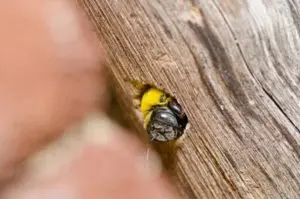The Facts on Carpenter Bees
When you think of wood-destroying insects, what is the first bug that comes to mind? Usually, our Houston pest control customers will answer “termites.” Termites are indeed among the most common wood-destroying insects, but they certainly aren’t the only ones to beware of. For instance, another wood-destroying insect you need to be on the lookout for is the carpenter bee.
Carpenter bees haven’t been spotted much for the past few months, they have been “hibernating” for the winter – but in spring and summer, all bets are off. Carpenter bees will emerge from their nests in search of mates as soon as the weather warms up, and by the end of summer, a new generation of them will be born. Naturally, that’s not a good thing for any home where they happen to infest.
Carpenter bees may be beneficial to parts of the garden (they are excellent pollinators), but they can also do significant damage to the wood structures on your property. For example, they can nest in wood fences, decks, and the fascia board of your home or shed. You can recognize their presence in your structures by their entrance holes, which are typically about a ½ inch in diameter, often with yellow stains around the hole.
We don’t want to alarm you regarding the risks of carpenter bees; the good news is that they don’t eat wood as termites do. However, they prefer to revisit their old tunnels rather than dig new ones; that means that if carpenter bees return to the same holes year after year, they can do significant damage. If you believe you have a carpenter bee infestation on your property, contact our Houston pest control service to schedule an evaluation. We will be glad to assess the risks these insects pose to your property.


